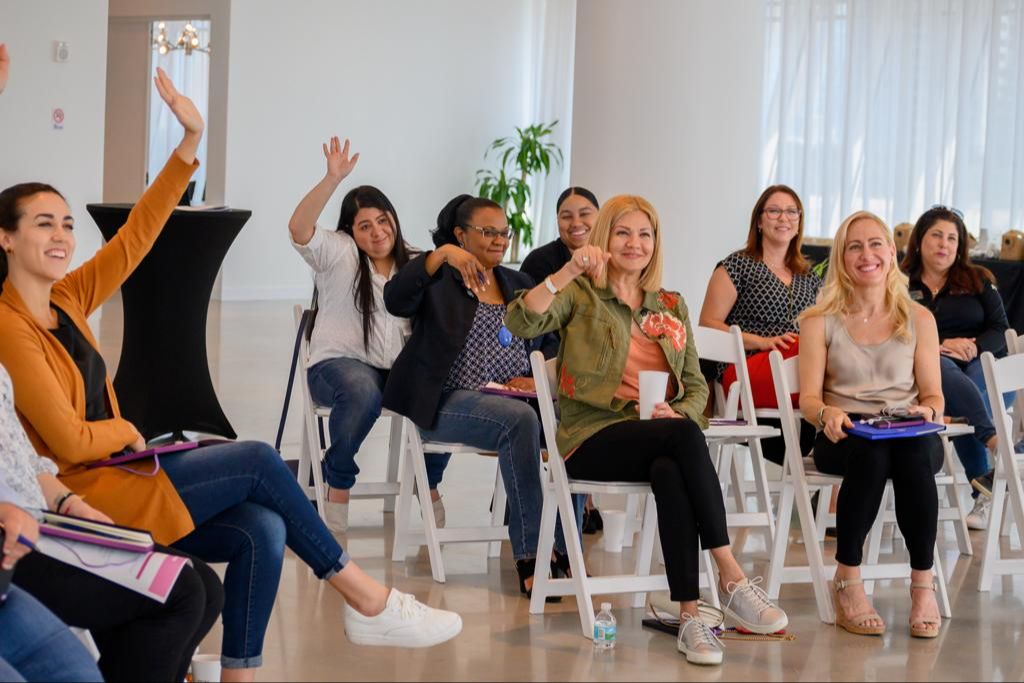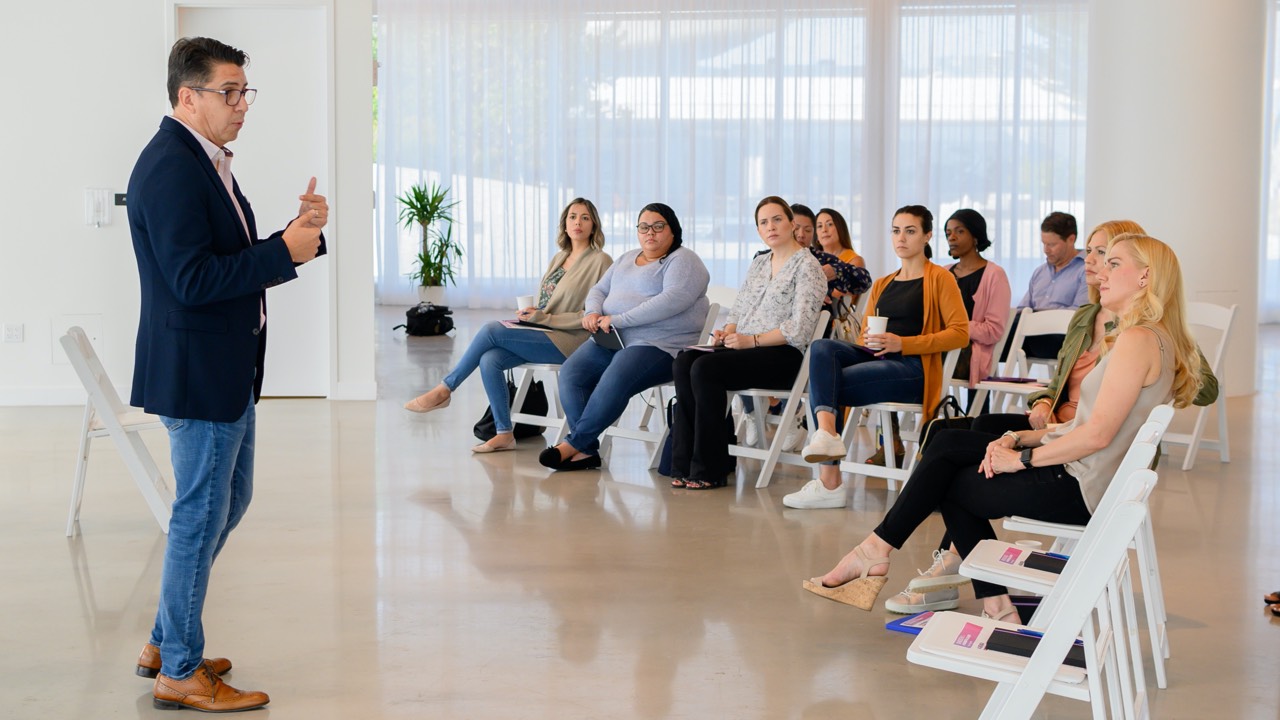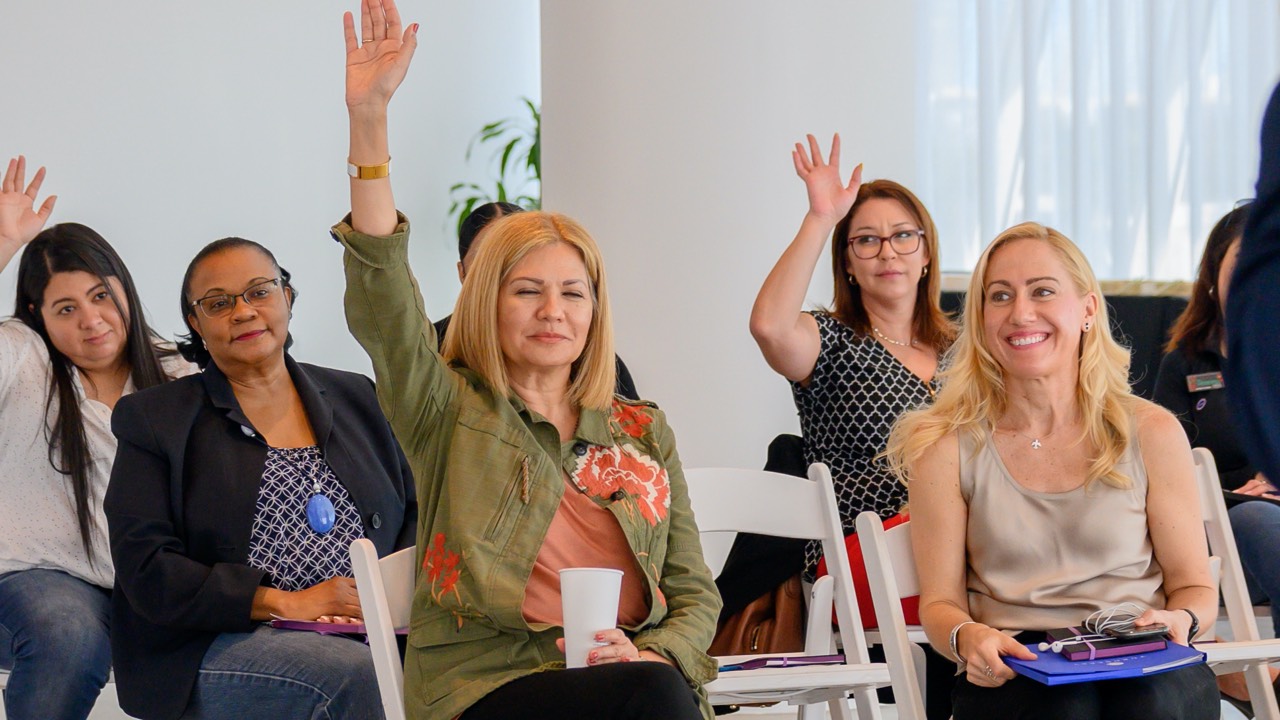Mentorías OnBeing Mindful
Un enfoque basado en inteligencia emocional y mindfulness para el alto desempeño y el bienestar personal.
Un proceso de desarrollo transformacional que mejora la efectividad profesional, potencia las capacidades de liderazgo y mejora la inteligencia emocional y el bienestar social y personal de los líderes.
CONOCE MÁSNUESTRO ENFOQUE
Cmbia tu mentalidad y modelos mentales para alcanzar tu máximo potencial
¿Qué hace única la Mentoría OnBeing Mindful?
Nuestra metodología de mentoría está basada en los fundamentos del mindfulness y la inteligencia emocional, lo que ayuda a los líderes a aprender cómo encarnar las habilidades y prácticas que generan un cambio sostenible.
Creemos que la verdadera transformación organizacional no solo depende de lo que hacemos, sino de cómo lo hacemos. Esto implica desarrollar una fuerza laboral emocional y socialmente inteligente, que comprenda mejor tanto a sí misma como a los demás, y cómo colaborar de la manera más efectiva.
Nuestra mentoría apoya a los líderes en:
- Alinear sus acciones con sus valores y reconectar con el significado en el trabajo.
- Cultivar una mente tranquila y enfocada para tomar decisiones con mayor claridad.
- Mejorar el rendimiento mediante la construcción de motivación, enfoque y eficiencia.
- Crear un entorno donde los demás se sientan vistos, escuchados y empoderados para ser ellos mismos.
- Crear condiciones internas que apoyen el bienestar general y un compromiso positivo en el trabajo.
La Mentoría OnBeing Mindful está diseñada para ayudar a cambiar la mentalidad y los modelos mentales de los participantes, más allá de enseñar nuevas habilidades e información. A corto plazo, esto significa ayudar a las personas a aplicar de manera más efectiva lo aprendido en nuestros programas a situaciones reales para generar un impacto inmediato. A largo plazo, significa cambiar fundamentalmente no solo cómo una persona lidera, sino quién es como líder, permitiéndole operar de manera más compleja, sistémica, estratégica e interdependiente.
Paquetes de Mentoría
Ofrecemos una variedad de paquetes de mentoría para satisfacer las necesidades organizacionales, que incluyen:

Mentoría de Alto Impacto:
(12 sesiones de 1 hora)
¿Para quién es? Participantes que desean profundizar en áreas clave de desarrollo para afianzar y mantener hábitos de liderazgo impactantes.
Este programa de mentoría está diseñado para apoyar a los participantes a profundizar en sus fortalezas de liderazgo y áreas de crecimiento, enfocándose en metas de desarrollo que promuevan la transformación personal y profesional. Los participantes aprenderán a cambiar no solo lo que hacen, sino cómo lo hacen, para generar un impacto más sostenido en su liderazgo y en quienes los rodean.

Mentoría Ejecutiva
(24 sesiones de 1 hora)
¿Para quién es? Líderes sénior y ejecutivos que desean convertirse en modelos a seguir de organizaciones emocional y socialmente inteligentes.
La Mentoría Ejecutiva está diseñada para líderes sénior y ejecutivos que buscan evolucionar sus habilidades de liderazgo para liderar y desarrollar organizaciones más emocional y socialmente inteligentes. Este programa ayudará a cada líder a responder a la pregunta: “¿Quién necesito ser para que mi organización prospere?” y a aprender cómo liderar el cambio transformacional en su organización.

Mentoría de Equipos
(10 sesiones de 1 hora)
¿Para quién es?
Equipos que quieren utilizar las habilidades de inteligencia social y emocional para mejorar la efectividad del equipo.
La Mentoría de Equipos está diseñada para grupos de 4 a 8 participantes, con el fin de profundizar en la experiencia de aprendizaje posterior a un programa.
Además de explorar cómo integrar mejor el material del programa, los participantes se benefician al aprender unos de otros a través de discusiones facilitadas, que pueden generar nuevas ideas para la aplicación y fortalecer la dinámica del equipo.
Estructura del Programa de Alto Impacto
Enfoque general:
Este viaje de 12 semanas está diseñado para ayudar a los líderes a cambiar no solo lo que hacen, sino cómo lo hacen. El enfoque está en crear hábitos de liderazgo sostenibles que tengan un impacto duradero, tanto personal como profesionalmente, mientras alinean sus acciones con sus valores y mejoran su bienestar general.

Weeks 1-2: Grounding in Emotional Intelligence and Mindfulness
- Week 1: Introduction to Emotional Intelligence (EI) and Mindfulness as foundational skills for impactful leadership. Focus on building awareness and attention through mindful practices (e.g., Three Breaths, Focused Attention).
- Week 2: Begin integrating mindfulness into daily life and leadership, emphasizing the role of attention and presence in decision-making. Introduce key practices for staying present in complex situations, such as Mindful Listening.
Outcome: Participants start to develop the presence and clarity needed for mindful decision-making in leadership, with attention to values-driven actions.
Weeks 3-4: Deepening Self-Awareness
- Week 3: Explore self-awareness, with a focus on emotional intelligence and how emotions manifest physically in the body. Use practices like Body Scan and Head-Body-Heart Check-in to increase emotional clarity.
- Week 4: Shift from emotional reactivity to emotional intelligence by practicing mindfulness in challenging emotional situations. Use tools such as Journaling and Mindful Eating to enhance self-awareness.
Outcome: Leaders increase their emotional self-awareness and begin to manage emotions effectively, supporting clear and compassionate leadership actions.
Weeks 5-6: Building Self-Management
- Week 5: Introduce self-management techniques to handle emotional triggers more effectively (e.g., SBNRR - Stop, Breathe, Notice, Reflect, Respond). Explore how to regain balance in emotionally charged situations.
- Week 6: Deepen the ability to manage difficult emotions with acceptance and self-compassion practices. Focus on building resilience and maintaining well-being in the face of leadership challenges.
Outcome: Participants strengthen emotional regulation skills, enabling more balanced and effective responses to challenging situations, thereby enhancing their leadership capacity.
Weeks 7-8: Anchoring Motivation and Purpose
- Week 7: Align actions with values and cultivate intrinsic motivation. Begin exploring meaningful work through Values Exercises and Envisioning practices to clarify leadership goals.
- Week 8: Build resilience, focusing on both emotional and cognitive resilience. Learn to navigate setbacks and challenges with greater optimism and a growth mindset.
Outcome: Participants gain clarity on their leadership purpose, aligning actions with values while fostering motivation and resilience in their work.
Weeks 9-10: Developing Empathy and Connection
- Week 9: Cultivate empathy by deepening self-awareness. Learn how emotional intelligence and empathy are interconnected, and practice skills like Empathetic Listening and Seeing Similarities to create deeper connections.
- Week 10: Focus on applying empathy in leadership. Learn how to balance empathy with decision-making and use compassion to create inclusive, empowered environments.
Outcome: Participants develop greater empathy, allowing them to lead in a way that ensures others feel seen, heard, and empowered, while maintaining strong leadership.
Weeks 11-12: Leadership Integration and Commitment
- Week 11: Integrate the core emotional intelligence and mindfulness skills into leadership practices. Focus on leading with insight, especially during difficult conversations, and explore how compassion enhances leadership.
- Week 12: Solidify leadership habits through the Leadership Commitment exercise. Set goals for continued growth, sustained impact, and ongoing practice of mindfulness and emotional intelligence.
Outcome: Participants leave with a clear leadership plan, strong emotional intelligence skills, and the practices needed to maintain their personal and professional well-being while continuing to grow as impactful leaders.
Executive Mentoring Program Structure
Overall Focus:
The Executive Mentoring journey is designed to elevate leadership capacity by developing advanced emotional intelligence, mindful leadership, and strategic vision. Leaders will focus on becoming role models for their organizations by learning to lead with insight, compassion, and strategic impact.

Phase 1: Foundations of Transformational Leadership (Weeks 1-8)
Weeks 1-2: Introduction to Emotional Intelligence and Mindfulness
- Week 1: Deep dive into the neuroscience and foundations of Emotional Intelligence (EI) and Mindfulness. Explore the relevance of EI in strategic leadership.
- Week 2: Cultivate mindfulness in decision-making and leadership. Begin core practices such as Mindful Listening and Open Awareness to develop greater presence.
Outcome: Leaders gain an understanding of how mindfulness and EI are critical to leadership success and start integrating these into daily practice.
Weeks 3-4: Self-Awareness and Leadership Identity
- Week 3: Build high-resolution emotional self-awareness. Use Body Scan and Head-Body-Heart Check-ins to refine emotional clarity.
- Week 4: Explore leadership identity through self-awareness practices. Leaders reflect on how their emotional landscape shapes their leadership style and decision-making.
Outcome: Leaders deepen their self-awareness and understand how their emotions and behaviors impact their organization.
Weeks 5-6: Advanced Self-Management Techniques
- Week 5: Enhance self-regulation by learning advanced emotional regulation techniques such as SBNRR. Explore how to manage high-pressure situations while maintaining leadership presence.
- Week 6: Deepen self-management through acceptance, self-compassion, and mindful responses to stress. Apply these skills in real-world leadership challenges.
Outcome: Leaders become adept at managing their emotions and responses in high-stakes situations, allowing for greater resilience and balance in leadership.
Weeks 7-8: Aligning Leadership with Values and Purpose
- Week 7: Align leadership actions with core values. Begin identifying the deeper values driving leadership and decision-making.
- Week 8: Create a vision for leadership rooted in purpose and values. Leaders reflect on long-term goals for themselves and their organizations, fostering intrinsic motivation.
Outcome: Leaders align their actions with a clear sense of purpose, guiding them toward sustained, values-driven impact.
Phase 2: Leading with Emotional Intelligence (Weeks 9-16)
Weeks 9-10: Cultivating Strategic Empathy
- Week 9: Develop empathy as a leadership skill. Use practices such as Empathetic Listening and Seeing Similarities to enhance connection with team members and stakeholders.
- Week 10: Apply empathy strategically in complex leadership situations. Explore how empathy supports difficult decision-making without compromising values.
Outcome: Leaders build stronger connections with their teams and stakeholders by leading with empathy, fostering a more collaborative and inclusive environment.
Weeks 11-12: Leading with Insight and Clarity
- Week 11: Develop insight into organizational dynamics through mindfulness and EI. Use strategic mindfulness to identify and address challenges within the organization.
- Week 12: Apply mindfulness to improve clarity in decision-making and communication. Leaders practice leading with clarity in high-stakes conversations and decisions.
Outcome: Leaders gain the ability to approach complex problems with insight and clarity, enabling more effective decision-making.
Weeks 13-14: Managing Change with Emotional Resilience
- Week 13: Build resilience by managing emotional and cognitive responses to change. Focus on resilience practices that enable leaders to adapt to organizational transformation.
- Week 14: Lead through change with emotional intelligence. Learn how to navigate personal and organizational challenges while maintaining resilience.
Outcome: Leaders strengthen their emotional resilience, enabling them to guide their teams through periods of change with confidence and clarity.
Weeks 15-16: Creating Inclusive and Empowering Environments
- Week 15: Lead inclusively by fostering an environment where others feel seen, heard, and empowered. Learn to apply EI to enhance team dynamics and collaboration.
- Week 16: Continue to develop compassionate leadership that empowers others. Explore how compassion enhances engagement and drives performance.
Outcome: Leaders create psychologically safe environments that foster innovation, collaboration, and high performance.
Phase 3: Leadership Mastery and Strategic Impact (Weeks 17-24)
Weeks 17-18: Developing Leadership Courage and Compassion
- Week 17: Explore the connection between courage and compassion in leadership. Learn how to lead with strength and empathy, even in difficult situations.
- Week 18: Apply compassionate leadership in challenging situations, balancing the needs of the individual with organizational goals.
Outcome: Leaders develop the courage to make tough decisions with empathy and compassion, ensuring long-term success for both people and the organization.
Weeks 19-20: Strategic Communication and Difficult Conversations
- Week 19: Learn the Difficult Conversations framework. Practice using emotional intelligence to navigate complex conversations effectively.
- Week 20: Apply strategic communication techniques in real-world situations. Leaders refine their ability to communicate with insight and emotional clarity.
Outcome: Leaders enhance their communication skills, making them more adept at navigating challenging conversations and driving organizational alignment.
Weeks 21-22: Leadership for Organizational Transformation
- Week 21: Explore how leaders drive organizational transformation by embodying the principles of EI and mindfulness. Reflect on how to create lasting impact.
- Week 22: Develop strategies for sustaining transformational leadership. Leaders plan for long-term change, both personally and within their organizations.
Outcome: Leaders understand their role in driving long-term organizational transformation and develop strategies for continuous leadership evolution.
Weeks 23-24: Leadership Integration and Long-Term Commitment
- Week 23: Integrate all learning into a cohesive leadership practice. Leaders reflect on their journey and consolidate their skills for long-term application.
- Week 24: Finalize leadership commitments and plan for continued development. Leaders create a roadmap for sustaining their growth and impact as they move forward.
Outcome: Leaders leave with a clear vision and a concrete plan for how they will continue to evolve as emotionally intelligent, mindful leaders who drive sustainable transformation.
Team Coaching Program Structure
Overall Focus:
The Team Coaching program is designed to help teams improve effectiveness, communication, and collaboration by developing emotional intelligence, mindfulness, and empathy. Through facilitated discussions and interactive activities, team members will learn to better understand themselves and each other, creating a more cohesive and high-performing team environment.

Session 1: Introduction to Emotional Intelligence and Mindfulness for Teams
- Focus: Introduce the foundational concepts of Emotional Intelligence (EI) and Mindfulness, specifically as they apply to team dynamics. Discuss why EI is critical for team effectiveness, especially in complex, high-pressure environments.
- Activities: Interactive mindfulness exercises (e.g., Mindful Listening), followed by group reflections on how attention and presence impact communication and collaboration.
Outcome: Teams understand the importance of mindfulness and EI in their interactions and begin developing a shared language around these concepts.
Session 2: Building Team Self-Awareness
- Focus: Explore how self-awareness in individuals contributes to team effectiveness. Help participants identify their emotional triggers and how these impact their interactions with others.
- Activities: Guided Head-Body-Heart Check-ins followed by group reflections on emotional patterns within the team. Practice emotional awareness through group body scans.
Outcome: Teams gain insight into each member’s emotional landscape, fostering better understanding and empathy for each other’s reactions and behaviors.
Session 3: Managing Emotions and Reactions within the Team
- Focus: Develop strategies for managing emotions and reactions within the team, with a focus on maintaining balance in high-pressure situations.
- Activities: Introduce and practice the SBNRR (Stop, Breathe, Notice, Reflect, Respond) technique as a team tool for navigating emotional triggers. Use real-life scenarios for group reflection and practice.
Outcome: Team members learn to self-regulate and manage emotions more effectively, reducing conflict and enhancing collaboration.
Session 4: Building Team Motivation and Alignment
- Focus: Align individual and team values to create intrinsic motivation and shared purpose. Explore how team members can find meaning in their work by connecting it to shared values.
- Activities: Values exercises to help team members identify their personal and shared values. Group journaling and reflection on how these values guide team behavior.
Outcome: Teams develop a stronger sense of shared purpose, aligning their actions with collective values for greater engagement and motivation.
Session 5: Enhancing Empathy and Communication in the Team
- Focus: Develop empathy as a core skill within the team, helping team members better understand each other’s perspectives and emotions. Focus on listening as a key to effective communication.
- Activities: Practice Empathetic Listening and Seeing Similarities exercises in pairs and small groups, followed by reflections on how empathy influences team dynamics.
Outcome: Team members enhance their ability to communicate empathetically, creating a more supportive and collaborative team environment.
Session 6: Creating Psychological Safety and Trust
- Focus: Explore how to create an environment of psychological safety, where team members feel comfortable sharing ideas, taking risks, and expressing vulnerability without fear of negative consequences.
- Activities: Practice Open Awareness and other mindfulness techniques that foster trust and safety. Team discussions on how to implement these practices in their day-to-day interactions.
Outcome: Teams build a foundation of trust and psychological safety, enabling open communication and innovation.
Session 7: Developing Resilience as a Team
- Focus: Strengthen the team’s collective resilience by developing strategies to navigate setbacks, challenges, and change. Focus on both emotional and cognitive resilience.
- Activities: Engage in group resilience practices (e.g., Hands on Chair, Envisioning). Reflect on past team challenges and how resilience strategies can be applied moving forward.
Outcome: Teams become more resilient in the face of adversity, equipped with tools to maintain focus, motivation, and collaboration during tough times.
Session 8: Managing Difficult Conversations as a Team
- Focus: Equip the team with strategies for handling difficult conversations, both with each other and within the broader organization. Learn to navigate conflict with emotional intelligence and compassion.
- Activities: Apply the Difficult Conversations framework to team scenarios. Role-play exercises to practice navigating challenging conversations with insight and empathy.
Outcome: Teams learn to approach difficult conversations with greater emotional intelligence, reducing conflict and improving communication.
Session 9: Leading with Compassion and Influence as a Team
- Focus: Encourage team members to lead with compassion and influence in their interactions with each other and with external stakeholders. Explore how compassion enhances leadership and team cohesion.
- Activities: Practice Compassion Reflections and engage in discussions about how compassionate leadership can enhance team performance. Focus on real-world applications of these skills.
Outcome: Teams begin to lead with compassion, empowering each other and creating a positive, supportive work environment.
Session 10: Team Leadership and Commitment to Continued Growth
- Focus: Reflect on the journey and solidify the team’s commitment to ongoing development. Focus on how to sustain emotional intelligence, mindfulness, and collaboration practices beyond the coaching program.
- Activities: Leadership Commitment exercise to help the team set long-term goals and practices for continued growth. Discuss how to maintain the progress made during the coaching program and how to hold each other accountable.
Outcome: Teams leave with a clear commitment to sustaining the practices learned, ensuring long-term effectiveness, collaboration, and continued growth as a cohesive unit.
GET STARTED TODAY!
OnBeing Mindful Mentoring
YOUR MENTOR
Rafael Puebla
With 25 years of international corporate experience, I’ve had the privilege of holding leadership roles at Fortune 100 companies such as MasterCard and American Express. Alongside my corporate journey, I’ve cultivated a deep mindfulness practice, becoming a Certified Mindfulness-Based Emotional Intelligence Teacher through the Search Inside Yourself Leadership Institute and a member of the International Mindfulness Teacher Association.
In November 2017, I founded OnBeing Mindful to help individuals become the best versions of themselves, leading more productive, meaningful lives—whether at work, with their families, or within their communities.
I’ve had the honor of training thousands of leaders around the globe, and my clients include companies and organizations like Uber, Nike, the United Nations, Capital One, PC Financial, Mastercard, and American Express, among others. As an international speaker, I focus on mindfulness and emotional intelligence, and I also mentor future teachers who are currently being certified as Mindfulness-Based Emotional Intelligence Teachers.
By combining my corporate experience with a solid mindfulness-based emotional intelligence foundation, I work with organizations of all sizes to foster environments where team members can thrive. I’m passionate about helping people find a deep sense of purpose and meaning in their work, where success is achieved with enthusiasm, and where work becomes a true source of personal fulfillment.

